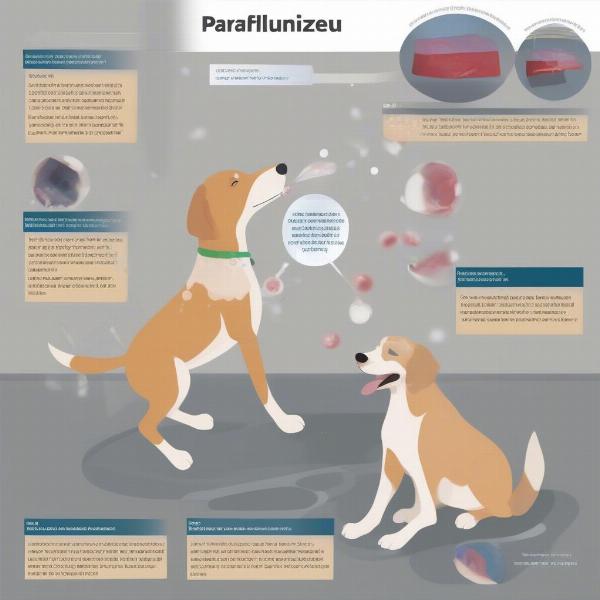Parainfluenza virus in dogs is a highly contagious respiratory infection that can cause kennel cough. It’s a common concern for dog owners, especially those who frequently take their dogs to dog parks, kennels, or other places where dogs congregate. Understanding the symptoms, treatment, and prevention of canine parainfluenza is crucial for responsible dog ownership.
Understanding Canine Parainfluenza
Canine parainfluenza is caused by a virus, specifically Canine Parainfluenza Virus (CPIV). This virus primarily affects the upper respiratory tract, leading to inflammation of the trachea and bronchi. While it can cause significant discomfort, it’s rarely life-threatening for healthy adult dogs. However, puppies, senior dogs, and dogs with compromised immune systems can experience more severe complications. The virus is spread through airborne droplets released when an infected dog coughs or sneezes. It can also be transmitted through contaminated objects like food bowls, toys, or bedding.
 Canine Parainfluenza Transmission
Canine Parainfluenza Transmission
Recognizing the Symptoms
The most common symptom of parainfluenza in dogs is a dry, hacking cough, often described as sounding like a “goose honk.” Other symptoms can include:
- Runny nose
- Sneezing
- Lethargy
- Loss of appetite
- Fever (in some cases)
These symptoms typically appear 2-7 days after exposure to the virus. It’s important to note that these symptoms can also be indicative of other respiratory illnesses, so a proper diagnosis from a veterinarian is essential.
Diagnosing and Treating Parainfluenza
If you suspect your dog has parainfluenza, consult your veterinarian immediately. They will perform a physical examination and may recommend additional tests, such as nasal swabs or blood tests, to confirm the diagnosis and rule out other conditions.
There’s no specific antiviral treatment for parainfluenza. Treatment typically focuses on managing the symptoms and supporting the dog’s immune system. This might include:
- Rest
- Cough suppressants
- Fluids to prevent dehydration
- Antibiotics (if a secondary bacterial infection develops)
In severe cases, hospitalization may be necessary to provide supportive care, such as oxygen therapy.
Preventing Parainfluenza: Vaccination and Other Measures
Vaccination is the most effective way to protect your dog against parainfluenza. The parainfluenza vaccine is often included in the core canine vaccinations, such as the C5 vaccination for dogs, and is typically given to puppies in a series of shots, followed by booster shots. Talk to your vet about the appropriate vaccination schedule for your dog.
Besides vaccination, other preventive measures include:
- Avoiding contact with infected dogs
- Keeping your dog’s living environment clean and disinfected
- Minimizing stress, which can weaken the immune system
Is Parainfluenza Contagious to Humans?
Fortunately, canine parainfluenza is not contagious to humans. However, it is highly contagious among dogs, especially in environments like kennels and shelters.
Conclusion
Parainfluenza in dogs is a common but manageable respiratory infection. By understanding the symptoms, treatment options, and preventive measures, you can help keep your furry friend healthy and happy. Regular veterinary check-ups and vaccinations are crucial in protecting your dog from this and other infectious diseases. Don’t hesitate to contact your veterinarian if you have any concerns about your dog’s respiratory health.
FAQ
- What is the incubation period for canine parainfluenza? The incubation period is typically 2-7 days.
- How long is a dog contagious with parainfluenza? A dog can be contagious for up to 3 weeks, even after symptoms have subsided.
- Can parainfluenza be fatal in dogs? It’s rarely fatal in healthy adult dogs, but puppies, senior dogs, and dogs with weakened immune systems are at higher risk of complications.
- Is there a cure for canine parainfluenza? There is no specific cure, but supportive care helps manage the symptoms and allows the dog’s immune system to fight the virus.
- How can I clean my home to prevent the spread of parainfluenza? Use a pet-safe disinfectant to clean surfaces that your dog frequently comes into contact with.
- What is the difference between parainfluenza and kennel cough? Parainfluenza is one of the viruses that can cause kennel cough, which is a complex of respiratory infections.
- Can my dog get parainfluenza even if they are vaccinated? While the vaccine significantly reduces the risk, it doesn’t guarantee complete immunity. Vaccinated dogs may still contract a milder form of the illness.
ILM Dog is a leading international dog website dedicated to providing expert advice and resources on all aspects of dog care and wellbeing. From breed selection and health to training and nutrition, we offer comprehensive information to help you be the best dog owner possible. We cover a range of topics, including vaccinations like the 6 way shot for dogs and seven way shot for dogs , as well as information on specific medications such as spectra 10 for dogs. For professional guidance on your dog’s health and wellbeing, connect with us via email at [email protected] or call us at +44 20-3965-8624. ILM Dog is here to support you and your canine companion every step of the way.